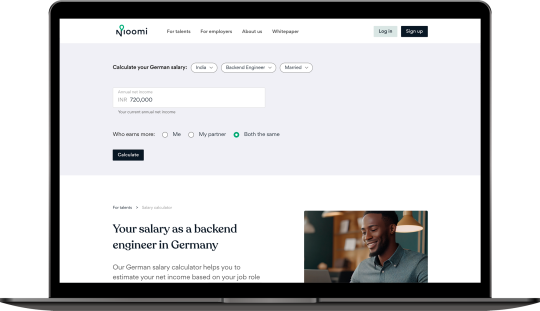Once you’ve decided to start a new chapter in your life and move to Germany for work, there’s plenty of things to organize. In this article we’ll cover key aspects such as finding an IT job, understanding salary expectations and selecting the right bank for you.
How to find an IT job in Germany
Germany’s IT industry is booming and the demand for skilled professionals is on the rise. Therefore it’s a good example to show how to find a job in that area. To kickstart your career in this tech-savvy nation, start by polishing your resume and LinkedIn profile. Some German companies prefer candidates who can communicate in both English and German, so consider enrolling in language courses if needed.
Networks like LinkedIn, job search engines such as Indeed or StepStone are excellent resources for job hunting. There are also some platforms specialized in connecting German companies with IT expats like nioomi.com or expat.com. When you are already in Germany you could also attend industry events or job fairs to start building up your network.
What salary to expect in Germany
Germany offers competitive salaries and a high standard of living, making it an attractive destination for expats. However, it’s essential to understand the salary expectations in your field. In general, salaries in Germany vary depending on your qualifications, experience and the city you choose to live in. Major cities like Berlin, Munich and Frankfurt tend to have higher salaries but also higher living costs. Be prepared for income tax, social security contributions and health insurance deductions. To get a clearer picture of your potential earnings, you can use online salary calculators like the one from nioomi. This tool helps you to estimate your net income based on your country of residence, the job role and your legal marital status.

How to choose a bank and open up a bank account in Germany
Once you’ve secured your job and settled in, it’s time to consider your banking options in Germany. Start by researching local banks and compare their offerings, fees, features and accessibility and define your needs. That way you can choose the bank which suits you best. Important factors might be an English interface of the banking app, an English speaking support team and online or mobile banking. After deciding for the banking option you need to gather all relevant documents to start the account opening process. The opening process can be very quick and easy depending on the bank you have chosen.
You can find an extensive guide on how to open a bank account in Germany here.
Other steps for your relocation to Germany
Arrange your visa
If you are not a citizen of the EU, EEA or Switzerland you must fulfill the following criteria to relocate to Germany:
Have a job offer in Germany
Have proof of financial stability and health insurance
With that you can apply for a Visa for Germany. Get your health insurance
Another important thing to prepare when moving to Germany is health insurance. Germany has one of the best-funded public healthcare systems in Europe. Residents can choose from private or public coverage, however most Germans have a public health insurance.
Your travel insurance usually doesn’t qualify. If you already got a job, you can sign up with a German health insurance. If you do not yet have a job you still need to secure the health insurance for your visa. An expat insurance might be a suitable option then as this is a temporary health insurance.
Find housing
Finding suitable housing is another critical aspect of your relocation to Germany. You can choose from your own apartments, shared apartments or houses. Make sure to familiarize yourself with the local transportation systems when choosing a location to look for housing. Also keep in mind that the first apartment doesn’t have to be your permanent one. Sometimes it is easier to look for a longterm place once you are in the city. So you can also start living as a sublet.
Learn German
Sooner or later it might be useful to know a bit of German. Whereas in the bigger cities most people do speak (a bit of) English, there are parts of the country where English is not widely-spoken. There are plenty of options to learn the language – from apps to online courses and live group classes.
Organizing your relocation to Germany for work comes with quite some To Dos. However there are great resources you can use to help you along the journey. There are also companies offering relocation services. It’s also good to talk to people who have already done it so you can learn from their experience.
Ready for your expat-friendly, German bank account? Get started today!
